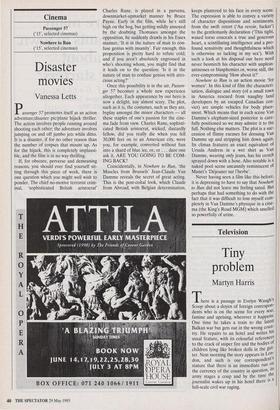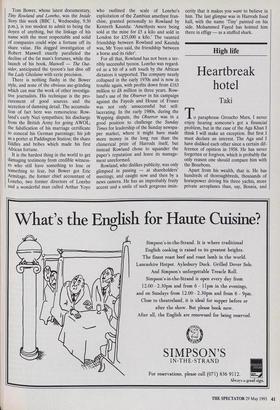Television
Tiny problem
Martyn Harris
here is a passage in Evelyn Waugh's Scoop about a doyen of foreign correspon- dents who is on the scene for every war, famine and uprising, wherever it happens. One time he takes a train to the latest Balkan war but gets out in the wrong coun- try. He repairs to an hotel and writes his usual feature, with its colourful references to the crack of sniper fire and the bodies of children lying like broken dolls in the gut- ter. Next morning the story appears in Lon- don, and such is our correspondent s stature that there is an immediate run on the currency of the country in question, its army stages a coup and by the time the journalist wakes up in his hotel there is 3 full-scale civil war raging.
Tom Bower, whose latest documentary, Tiny Rowland and Lonrho, was the Inside Story this week (BBC 1, Wednesday, 9.30 p.m.), is too modest to admit to being the doyen of anything, but the linkage of his name with the most respectable and solid of companies could wipe a fortune off its share value. His dogged investigation of Robert Maxwell exactly paralleled the decline of the fat man's fortunes, while the launch of his book, Maxwell — The Out- sider, anticipated the tycoon's last dive off the Lady Ghislaine with eerie precision.
There is nothing flashy in the Bower style, and none of the obvious axe-grinding which can mar the work of other investiga- tive journalists. His technique is the pro- curement of good sources and the accretion of damning detail. The accumula- tion of fact here was remorseless: Row- land's early Nazi sympathies; his discharge from the British Army for going AWOL; the falsification of his marriage certificate to conceal his German parentage; his job as a porter at Paddington Station; the share fiddles and bribes which made his first African fortune.
It is the hardest thing in the world to get damaging testimony from credible witness- es who still have something to lose or something to fear, but Bower got Eric Armitage, the former chief accountant of Lonrho, two former directors of Lonrho and a wonderful man called Arthur Yoyo who outlined the scale of Lonrho's exploitation of the Zambian amethyst fran- chise, granted personally to Rowland by Kenneth Kaunda: 'Amethysts were being sold at the mine for £5 a kilo and sold in London for £35,000 a kilo.' The vaunted friendship between Rowland and Kaunda was, Mr Yoyo said, the friendship 'between a horse and its rider'.
For all that, Rowland has not been a ter- ribly successful tycoon. Lonrho was regard- ed as a bit of a soft touch by the African dictators it supported. The company nearly collapsed in the early 1970s and is now in trouble again, with profits down from £163 million to £8 million in three years. Row- land's use of the Observer in his campaign against the Fayeds and House of Fraser was not only unsuccessful but self- lacerating. In the early 1980s, during the Wapping dispute, the Observer was in a good position to challenge the Sunday Times for leadership of the Sunday newspa- per market, where it might have made more money in the long run than the chimerical prize of Harrods itself, but instead Rowland chose to squander the paper's reputation and leave its manage- ment unreformed.
Rowland, who dislikes publicity, was only glimpsed in passing — at shareholders' meetings, and caught now and then by a news camera. He has an improbably fruity accent and a smile of such gorgeous insin- cerity that it makes you want to believe in him. The last glimpse was in Harrods food hall, with the name 'Tiny' painted on his side. Mohammed Fayed has hoisted him there in effigy — as a stuffed shark.



















































 Previous page
Previous page